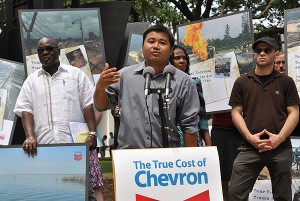 Soon after we announced the winners of our What About Peace? contest in April, reports of tragic acts of hate, violence, and intolerance began to unfold in Nigeria. These heartbreaking stories were a stark contrast to the stories of hope that we received from a school in Nigeria that were submitted for the What About Peace? contest.
Soon after we announced the winners of our What About Peace? contest in April, reports of tragic acts of hate, violence, and intolerance began to unfold in Nigeria. These heartbreaking stories were a stark contrast to the stories of hope that we received from a school in Nigeria that were submitted for the What About Peace? contest.
One of those stories came from Grand Prize winner, 15 year old Ebuka Ikeora. We reached out to Ebuka and his teacher, Chima Emmanuel to share their perspectives.
This summer, we will feature the words from enthusiastic winners of the contest and we’ll share their thoughts behind the incredible art they presented and what this big win means to them. These anecdotes not only showcases their art pieces but also encourages fellow students to come up with great entries for the new school session.
Ebuka’s words for peace really inspired the judges. What struck Grand Judge, Carleen Pickard the most was “it encourages us all to take action daily in our community to make peace at home.”
When asked to comment about the ongoing conflicts in his own country Ebuka says, “Let there be peace, let there be true harmony, let us all refuse to be enemies, let us build a Nigeria for tomorrow, let us make a new history for our children today that we have wiped our ugly past and let us feel peace in our arms again. The message of peace relevant in our time is ‘WE REFUSE TO BE ENEMIES’
Here are their stories…
In conversation with Grand Prize Winner- Ebuka Ikeora
 Congratulations on your great win! How does it feel to win such a grand prize and that too competing with so many international array of entries?
Congratulations on your great win! How does it feel to win such a grand prize and that too competing with so many international array of entries?
Thank you so much. I want to express from the depth of my heart my gratitude to Global Exchange. I never knew it was a reality till my teacher Mr. Emmanuel broke the news to the entire class. I was short of words. I am a Nigerian, black, and yet made headway in this competition. Thank you God.
The essay written by you- ‘They Learned to Kill’ is definitely a very thought-provoking read. What inspired you to write about how peace can be promoted?
Nigeria is a story and case study any day. Our class teacher Mr. Emmanuel loves to discuss about peace. He has told us many stories of war and would always tell us that peace is the best way of life.
How did you find about the contest?
I heard it from Mr. Emmanuel Ugokwe. It was thrown open to every student and we knew already what to write and were all geared up for the contest.
Your first thoughts of participation?
I did not write the essay to be the grand winner, but like I said, I have a story that needs to be told and when the right time for it came, I did write.
Were you confident of winning the contest?
No.
How do you define peace in one line?
It is the true union of hearts that gives man the opportunity to live a more meaningful and productive life with others.
Who do you most admire in your life?
Mr. Emmanuel Ugokwe. He is such a goodhearted man who came as a gift to this generation. As a writer, he has put up many things for public, yet he is humble. He is behind every move I make and helps me all the way.
On what issues you like to write about the most, other than peace and democracy.
I like to write about the violence against women, equality of humans, health issues for the minor and pure freedom.
In conversation with Ebuka’s Teacher- Chima Emmanuel
 You have been an important part of this win. How does it feel?
You have been an important part of this win. How does it feel?
I feel like a newly crowned king, so happy for my student Ebuka winning the grand prize.
How did you convey ‘What about Peace’? contest to students?
I told the students about the contest during the class. Many expressed interest and wrote.
Students write best about what concerns them the most. Is this why Ebuka chose to participate in the contest or was it you who promoted/persuaded him?
We have writing class and many of our students over the years have won many awards. They like to write on global issues like peace, pollution, security and the rest. I promote these issues to my students. I encourage them to make their voices heard, but I don’t persuade them. We won juror award winners and honorable mention last year and this year as well.
What do you like the most about Ebuka?
He is humble and wants to learn. He was not good in writing before but when I brought to his attention that writing can take him to places and expose him to many fundamental facts, he picked from there. We relate as friends like all my students. He has been invited to United Kingdom to receive his essay award by Living Forest.
How do you plan to celebrate this win with Ebuka?
Already our graduation ceremony is on the 27th July and school management is planning it big to applaud Ebuka. He will be crowned writing ambassador for the year and we plan to celebrate this all year long for this pride he brought home.
Could you share with us some real life experiences where you have actively promoted peace among people.
I like to promote peace to my students. We also practice peace, preach it in our school and educate our children to see peace as a way out of the many mistakes in the society. I make peace with people whenever the need calls.
Do you think Global Exchange’s ‘What about Peace’ program is an inspiring platform for students like Ebuka to creatively write about peace and share their feelings.
Absolutely. Global Exchange is providing the entire world with the message of peace.
What will be your message to the Nigerian government which is currently facing widespread violence and crisis?
It is really bad to see what all is happening in Nigeria. The government needs to do something to bring back our girls. We have to fight for the respect and equality of our women and stop the violence.
Ebuka and Chima’s peace messages encourages us all to act everyday and become aware of our universal connection. Their stories underlines the ongoing conflict that has been a large part of their life as Nigerians. But it is not the theme of violence that dominates their stories, but rather a sense of hope for a better tomorrow and the need to come together in times of conflict to bring hope and call for peace.
Congratulations to Ebuka on his win, as well as to his teacher Chima Emmanuel for also taking the time to share their words with us!
————
What About Peace? is a Global Exchange international arts contest for youth ages 14–20 to express ideas and thoughts about peace by responding to the question, “What About Peace?” through artistic expression.
This post was written by social media intern Sakshi Pathania.

